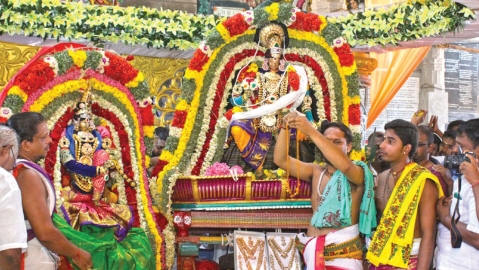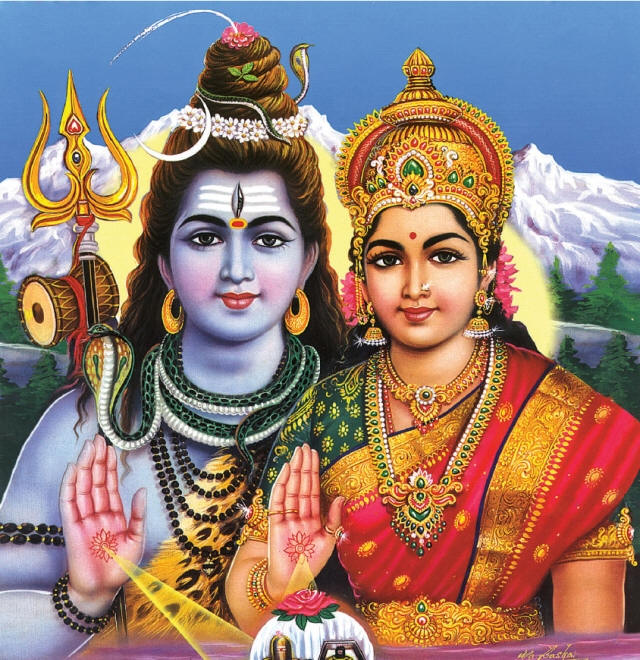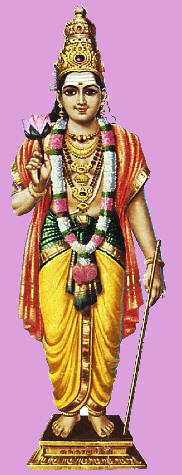Published:15 Jul 2019 8 PMUpdated:15 Jul 2019 8 PM Sakthi Vikatan
சக்தி கொடு! - 8
க.சதீஷ்குமார் K. Sathishkumar

3. We, too, in this month of Ādi can learn one or two events in the surging Grace of Sundarar's holy history.
4. Sundarar stays close to Śivaperumāṉ in the Holy Kailas. Once, he went to the flower garden to pluck flowers. There, he cast his lusty eyes on Parvati's companions: Kamaliṉi, Aninthai, and others for a second. The result was the nearby Śiva dispatched him to take Avatar in the world.
5. That is the way Sundara Mūrthy Adigal took his earthly Avatar. Why did it happen that way? Tirumuruga Vāriyār Swāmigaḷ explains it beautifully, "The Śaiva saints sang Śiva panegyrics. Who sings the glory of the servitors?"
6. Using the proximate Sundarar, Śiva thought of getting him to sing the glory of the servitors. Therefore, Śiva deployed Sundarar's thoughts and eyes towards Sakthi's companions Kamaliṉi and Aninthithai and blessed him with grace.
7. "Śiva rendered Kāma to ashes for disrupting his meditation. The place Śivaperumāṉ remains is where the proximate individuals will not entertain any thoughts of love and lust. This is the essence for realization," said Vāriyār Swāmigaḷ. For the life and prosperity of the South that performed great penance and for the presentation of evil-free Tirutthonḍath-Thokai, Śivaperumāṉ conferred such grace and blessings," said Vāriyār.
8. Sundarar took Avatar on the earth, as the holy son of Tirunāvalur Ādhiśaiva Vēdhiar Sadaiyaṉār and Isaijñāṉiyār. When he came of age, his parents arranged for him to get married to the daughter of Sivachariar. When the king and others assembled in the wedding Pandal and the ceremony was in progress, Śivaperumāṉ entered the pandal, disguised as an older man.

10 Śiva, as the uninvited guest, was up to some mischief and said, "This bridegroom Sundaran is my slave." All the assembled people were surprised. Some emitted derisive laughter. Not paying any attention to these events, Śiva approached Sundarar and said, "Here is the palm-leaf chit (document)." Back and forth, the conversation deteriorated into an argument.
11. Sundarar tried to grab the evidentiary note from Śiva's hand. As the older man Śiva took to his heels, Sundarar followed him. Paramaṉ did not run too far; that was not his intention. Sundarar caught up with Śivaperumāṉ, grabbed the promissory note, and tore it into bits. Using Sundarar's violent act as evidence of his guilt, Śivaperumāṉ addressed the crowd as follows, "Hear ye, hear ye! That he took from me by force the palm-leaf slavery document and tore, is strong evidence that Sundarar is my slave."
12. The crowd, in a fit of confusion, addressed the elderly man, "Swamy! Your argument is an unjust practice. Who are you? Wherefrom do you come? The old man replied, "I am the head of this Sundaran. My town is Tiruveṇṇainallūr." He continued arguing with everyone in sight.

14. The members of the town council addressed the plaintiff, "Ayyā! You must prove beyond reasonable doubt Sundarar is your lawful slave. You have three ways to do it: 1. Undisputed Right of ownership of property, 2. A writ (Copper-plate grant), and 3. Witnesses: neighbors, or strangers. You must at least show us one evidence."
15. You must present at least one out of three: Ownership, Bonded service, Witnesses: neighbors or strangers. - Sēkkizhār
The elderly-appearing Śivaperumāṉ spoke with intensity and said, "I have in my possession a written document as the witness. What Sundarar tore up was not the original document. It was a copy. If you prevent him from tearing up the original, I will show you the palm-leaf document," The council members accepted his proposition. Śivaṉār presented the document to the council members. A member read it aloud.
'அருமறை நாவல் ஆதி சைவன்
ஆரூரன் செய்கை
பெருமுனி வெண்ணெய்நல்லூர்ப்
பித்தனுக்கு யானும்
என்பால் வருமுறை மரபுளோரும்
வழித்தொண்டு செய்தற்கோலை
இருமையால் எழுதி நேர்ந்தேன் Verse 205 Periyapurāṇam
16. "This is my signature." That was identifiable. The mediators confirmed the authenticity of the signatures of the witnesses at the assembly. Each mediator agreed it was his signature. The heads of the council said, "Sundarā! Is this the signature of your grandfather? Look at it before you testify."
17. Śiva, in the guise of the old man, smiled and said, "He could not have seen his grandfather and not the right person to identify the grandfather's signature. Bring another signature of his grandfather and make a comparison."
18. They made Sundaraṉār bring in other ownership deeds from the repository and made a comparison of the signatures. The two documents showed the same names and signatures. The head of the council said, "Sundarā! What this older man says is true. You are his slave. Listen to him and do the service to him."
19. The heads of the council, looking at Śivaperumāṉ, said, "Swamy! The palm-leaf document says you hail from our town. But we never saw you before in the town. Show us your house."
In Tiruvārūr, Sundarar's holy wedding.
20. Śivaperumāṉ: "Go with me. I will show you my dwelling."
21. The members of the council and others followed him with Śivaperumāṉ at the head. Śiva walked into the temple Tiruvaruḷthuṛai in Tiruveṇṇainallūr; he disappeared; the followers were amazed. But Sundarar went further inside and called the older man with love and respect. Will Īśaṉ hold out even after this call from Sundarar? God gave his appearance with Ambikai seated on the bull.
22. Śiva said, addressing Sundarar, "Previously, you were a devotee and slave of mine. Because of your lust, you were born on this earth. I took control of you. You argued with me using harsh words, and so I call you 'Vaṉthoṇdaṉ' (hard slave) You called me 'Piththaṉ' (Lunatic). You can sing my panegyric calling me Piththaṉ. That was Śiva's Grace and blessing to Sundarar.
23. "Pittā piṛaisūdi" (The Lunatic wearing a crescent moon) was the beginning of the poems of Sundarar on Śiva.
24. Dear readers! Please read the biography of Sundarar once again and impress it on your mind well.
25. These events, beginning in Kailas and spreading before our eyes, is not some story! This a historical event in Tamil Nadu. The places, where the life events of Sundarar happened exist to this day. Rock engravings and ancient historical writings in Tamil Nadu bear testimony to Sundarar's life in many forms.
26. Therefore, do not think, "Will events come along as they happened to Sundarar?" Even to this day, events of this nature are happening in many people's lives."
27. When you elucidate the events in Sundarar's life, the truth is apparent. God speaks to obstruct him and take control of Sundarar. The latter resists and defies God. He argues. Likewise, God, in everyone's life, blocks a devotee from evil ways and accepts him or her as a slave with grace.
தடுத்தாட்கொள்(ளு)-தல் hinder the devotee from evil ways and accept him as a slave, admit into one's good graces, as God does a faithful devotee
ஆட்கொள்ளுதல் to take him as a slave, take him into one's good graces, as God does a faithful devotee
தடு = obstruct
28. 'God…coming to talk to us.' Don't think like that. In Sundarar's life, God did not come in his natural form. In agreement with the maxim, 'God in the form of a human,' God comes in the guise of a man, that too in the guise of an old man, wise and experienced (mature in wisdom and age), speaks to obstruct him from evil ways, give grace and take him as a slave.
29. We resist him under a false premise, 'Here he comes, always with advice… Do something useful." Even then, God does not let go of you. As he showed Sundarar, he shows evidence. We, on the other hand, as Sundarar did, discard, or destroy the evidence.
30. When we do not accept God's path, God speaks to us in the town's assembly hall. If we argue with him, he shows extensive evidence. The document presented to the council is the Xerox copy, which is the old palm-leaf manuscript. In the end, when we realize the truth, we attain a higher station in life- a divine state like that of Sundarar.
31. What other worry do we have after that? Is it not true that the responsibility falls on the shoulders of the one who is an Obsctructor, Rescuer, Slavemaster, and Grace-giver? For our welfare, Sundarar's life was an example and a historical record.
32. Sundarar married two brides: Paravaiyār and Sangiliyār. That is a long story. Did we not read about Kamaliṉi and Aninthithai seen by Sundarar in Kailas? These two in Kailas are the reborn brides on earth: Paravaiyār and Sangiliyār.
33. Sundarar married these two. Śivaperumāṉ (the Lord, the Obstructor, the Slaver, and the Grace-giver) takes on the responsibility for Sundarar's householder's life. This marital story is a historical event explaining it.
34. The rich Kuṇdaiyūrkkizhār had a great affection for Sundarar. He used to send to Paravaiyār mansion paddy and other items.
35. Once because of drought, the crops wilted, and there was a shortage of grains. Kuṇdaiyūrkkizhār was unhappy about the impediment and interruption to his public service and prayed to Śivaperumāṉ, "I am unable to supply grains to Sundarar, the best among men. O Śiva! Please grant me your grace and blessings."
36. Will God let the mind of a servitor depressed and tired? Maṇāḷan of Malaimagaḷ (the husband of the daughter of the mountain = Śivaperumāṉ) piled up many mountain-high paddies.
37. Hearing the news, Sundarar saw the hills of paddies, went to the nearby temple, Tirukkōḷili and sang a poem, "Emperumāṉē! The paddies must reach Tiruvārūr to please Paravaiyār. Please give us grace and blessings."
The grace of Śiva moved the paddy mountains to Tiruvārūr. The streets were chockfull of paddy mountains. Paravaiyār was ecstatic.
39. That sounds fine. Where is the paddy stored? How does one distribute it?
40. Paravaiyār did not give it a thought. She drummed the news, "Whatever you see in front of your house is yours."
41. This event was registered and documented. Kuṇdaiyūrkkizhār, endowed with immense wealth, gave grains and pulses to Sundarar with the conviction that his riches should help the good and the virtuous. Where is the surprise in the grant of grace and blessings by Śivaperumāṉ to such a person's supplication?
42. The God, who gave the paddy on entreaty from Kuṇdaiyūrkkizhār, delivered it in the town wherein Paravaiyār lived, according to the request of Sundarar.
43. Paravaiyār, having received the paddy, did not keep the paddy for herself and instead, shared it with a simple formula. That indicates her pure mind and soul.
44. For the craver, he created a donor. For the donor, he established grace, as sung by Appar Swāmigaḷ. To conform with Appar's saying, God went searching for Sundarar and Paravaiyār and granted the grace and the boon. This descriptive historical event as a theme is in Tirukkuraḷ praised as Tamizh-Maṛai (Tamil Veda).
45A. 'பகுத்துண்டு பல்லுயிர் ஓம்புதல் நூலோர்
தொகுத்தவற்றுள் எல்லாம் தலை' – Kural 322.
Kural verse 322.
Of all the virtues, the first and the foremost is sharing and eating the food, and protecting all lives.
45B. The Paddy Story is the definition of Tirukkural. Paravaiyār, having received mountains paddy and distributed it to all, is the epitome of virtue. That is why God himself went in search of Paravaiyār, said Sēkkizhār Swāmigaḷ.
46. On Ādi Cuvāti, Sundarar attained the holy feet of Haraṉ (Śiva) at Ādi Cuvāti (= July-August and the 15th Nakṣatra Lunar constellation, 27 in number, viz., acuviṉi1, paraṇi, kārttikai, urōkiṇi, miruka-cīriṭam, tiruvātirai, puṉarpūcam, pūcam, āyiliyam, makam, pūram, uttiram, astam, cittirai, cuvāti15, vicākam, aṉuṣam, kēṭṭai, mūlam, pūrāṭam.) Reading Sundarar's sacred history, and celebrating him, let us ask Paramaṉ (The Supreme God) to grant us blessing and grace as he gave them to Sundarar.
46. God will undoubtedly give grace and blessings.
Will continue.